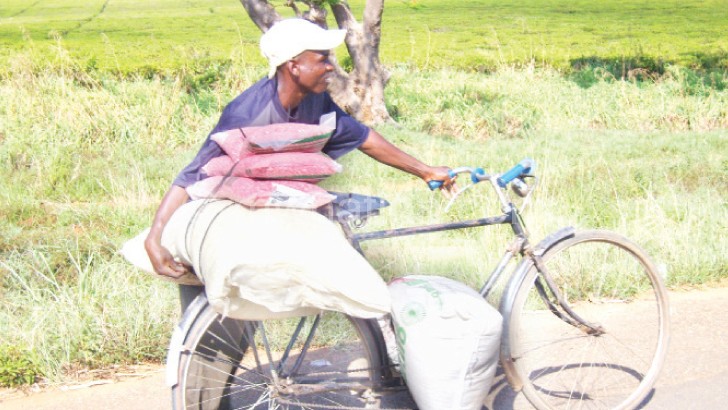Fisp in dire straits
Smarting from scarcity or late delivery of inputs, a situation report paints a bleak picture of the 2016/ 2017 Fisp that it is dogged by low redemption of seed coupons, a development experts say threatens food security.
According to a Logistics Unit 21st Situation Report released on January 24 2017, the redemption rate of coupons was at 39 percent, suggesting that most Farm Input Subsidy Programme (Fisp) beneficiaries did not buy seed, but opted for the recycled ones while fertiliser coupon redemption rate was at 70 percent.
The report also puts the redemption rate of legumes coupons at 39 percent.

Reads the report: “It would appear that the farmers are more willing to put their resources into fertiliser than seed. An analysis is perhaps required to determine if this is the result of unavailability of seed or late distribution of vouchers.”
Commenting on the matter, Lilongwe University of Agriculture and Natural Resources (Luanar) soil scientist Pattinson Nalivata said there are different analogies that can be drawn from the low redemption of seed coupons, which may affect household food security for smallholder farmers.
“It could mean that farmers already planted, such that they did not need the coupons, or that they bought using other means or simply that they have recycled last year’s seed which can affect production,” he said.
Nalivata further said since most smallholder farmers grow maize purely for consumption, it means government will still need to support such families.
Civil Society Agriculture Network (CisaNet) national coordinator Tamani Nkhono Mvula said the development is generally going to affect output as the efficiency of Fisp is a combination of fertiliser and hybrid seeds used.
He said if people take the fertiliser and use it on local seeds or recycled seeds, the output is going to be low.
“But that is the first side of it. The second side of it can be looked at from the difference between the fertiliser coupon redemption rate and the maize seed coupon redemption rate. For seed, what happens is that the people that want to buy the seed go to the dealers to look for it and buy.
“There are specific companies which are dealing with seeds but the same is not the case with fertiliser. Now, it is something that we need to critically look at why is that the redemption rate of fertiliser coupon is much higher than the seed coupon.
“One of the issues that some reports have found out and also the news that we are getting is that there are a lot of fertiliser coupons that are being sold by the farmers because Fisp fertiliser is not readily available. So, a farmer who has sold a fertiliser coupon cannot be expected to buy seeds,” said Nkhono-Mvula in a telephone interview.
He added that if he can make a correlation on the development, he would say that the fertiliser that has gone to the actual smallholder farmers could be somewhere closer to the percentage of seed coupons that have been redeemed.
Seed Traders Association of Malawi (Stam) board chairperson John Lungu said the low redemption rate could be as a result of delays in both vouchers and the seed itself.
“I have not looked at the logistics report, but we had a bit of delay in seed distribution which could affect production in one way or another. We know that farmers recycle seed all the time, it’s a problem which needs to be dealt with, but we are hopeful for the best,” he said.
However, deputy Fisp coordinator Osborn Tsoka disputed the report’s findings, saying government’s monitoring report is indicting a 90 percent seed redemption rate.
“We are aware of the Logistics Unit report which is based on the number of coupons submitted. It is very possible that some companies are still processing while ours takes into consideration all the vouchers that have been sent out and our records show that 90 percent have gone out.
“There’s no need to worry about low production or delays affecting production, and, moreover, the programme is still on,” he said.
The 2016/17 Fisp has been dogged with irregularities such as scarcity or late delivery of inputs, which has led to some beneficiaries selling coupons, four or more people sharing a bag of fertiliser while in some cases fertiliser and seed prices have proved to be too prohibitive. n
Additional reporting by Mercy Malikwa





